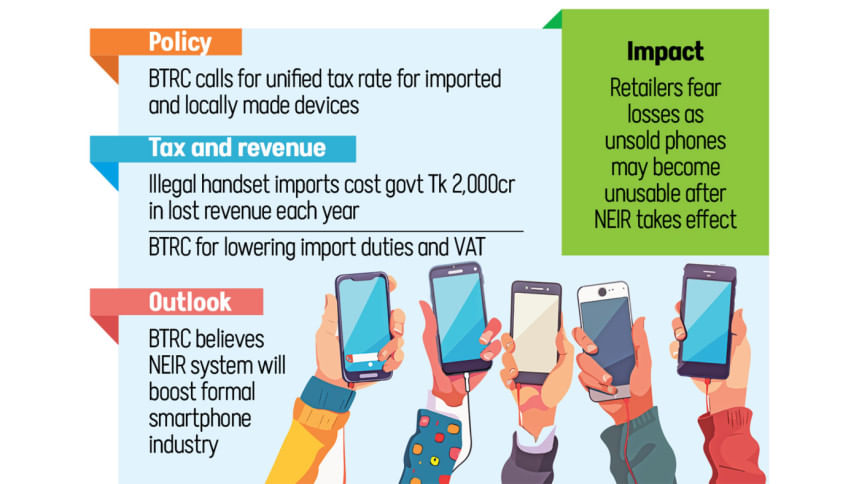Fix tax rates for illegal phones before NEIR launch

The Bangladesh Telecommunication Regulatory Commission (BTRC) has asked the government agencies concerned to set a tax rate for illegally imported but unsold mobile phones currently sitting in retail shops, and to determine a clear timeframe for legalising these devices.In a letter issued last week, the regulator also urged the government to consider lowering import duties and VAT on mobile phones while creating a harmonised tax structure that applies consistently to both imported and locally ma...
The Bangladesh Telecommunication Regulatory Commission (BTRC) has asked the government agencies concerned to set a tax rate for illegally imported but unsold mobile phones currently sitting in retail shops, and to determine a clear timeframe for legalising these devices.
In a letter issued last week, the regulator also urged the government to consider lowering import duties and VAT on mobile phones while creating a harmonised tax structure that applies consistently to both imported and locally manufactured devices.
The letter was sent to the Posts and Telecommunications Division and copied to the National Board of Revenue (NBR), according to officials familiar with the matter.
The need for a clear policy has become more pressing because of the upcoming introduction of the National Equipment Identity Register (NEIR), a system that will prevent any unregistered, duplicate-IMEI, or fake-registered phone from connecting to mobile networks after December 16, 2025.
Devices already active on the networks before the launch will not be disconnected, but phones that have never been activated, many of which are now displayed in retail shops, face an uncertain future.
Retailers have told the BTRC that without a structured process to legalise these devices, they risk being left with large volumes of stock that cannot be sold once NEIR is operational.
"As per our authority, we have decided to register the unsold handsets currently in the market," said Md Emdad-ul-Bari, chairman of the BTRC.
However, the key question remains whether that registration should require the payment of taxes. "If taxes are to be required, it is up to the NBR to set the rate."
The BTRC's letter refers to NBR estimates suggesting that illegal handset imports result in annual revenue losses of about Tk 2,000 crore.
Such devices enter the market without paying duties or VAT, undermining compliant importers and disadvantaging local manufacturers who are compelled to operate within the formal system.
The commission also argued that Bangladesh's current tax structure for handsets is higher than that of many comparable markets, leading to higher consumer prices and weakening the willingness of businesses to import or produce devices legally.
The letter notes that smartphone penetration in Bangladesh remains around 63 percent despite nationwide 4G coverage, meaning millions of people still lack access to internet-based services simply because they do not own compatible handsets.
Lowering duties and rationalising the tax structure, the commission argues, would help make smartphones more affordable and expand access to digital services.
BTRC stressed the importance of establishing fair competition between locally produced devices and imported phones.
It said that without alignment in tax policies, local manufacturers will continue to face an unfair disadvantage, particularly against illegally imported devices that enter the market without duty or VAT documentation.
A harmonised tax structure, the letter added, would "ensure the interests of all involved" and enhance consumer confidence.
The commission believes that once NEIR becomes operational, the use of illegal handsets will decline significantly, shifting more of the market towards legally imported and locally produced smartphones.
This shift, it said, would help the handset industry grow and increase its contribution to the national economy.